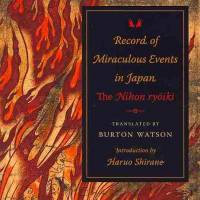Compiled in the early Heian Period (794-1192), the "Nihon ryoiki" comprises the country's first major collection of anecdotal literature, or setsuwa. The collection contains 116 spoken stories over three volumes that were passed from person to person, village to village, until they were finally recorded on paper by a self-ordained priest called Kyokai around 820.
This eye-opening translated work by Burton Watson helps trace the nascent spread of Buddhism into Japan at the time, illustrating how these new teachings were disseminated throughout Japanese towns and cities.
The Heian Period — as well as the Nara Period before it — was a time fraught with punishment, at least if the titles contained in this collection are concerned. Indeed, it doesn't take much to work out what the tale titled "On an Evil-Loving Man Who Got an Immediate Penalty, Being Killed by Sharp Swords and Suffering an Evil Death" entails — although, even then, the ending may shock you.
Although the "Nihon ryoiki" occasionally features high-ranking aristocrats, most of the stories concern commoners on a much lower level of society. The Aesop-esque tales do also celebrate the odd act of benevolence but for the most part, they offer equally solid pieces of advice on how to avoid a painful final few minutes of your life. As "Record of Miraculous Events in Japan" makes clear, karma is something that always comes back to haunt you in the end.



















With your current subscription plan you can comment on stories. However, before writing your first comment, please create a display name in the Profile section of your subscriber account page.